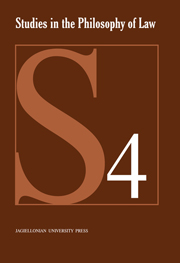Book contents
- Frontmatter
- Contents
- Preface
- Six Causes of the Dispute over Legal Bioethics
- Bioethics and Legal Philosophy
- The Outline of the Subject of Biojurisprudence
- Law and Biotechnology
- The Ethical Significance of Evolution
- Human Nature after Darwin
- The Notion of the Person in Bioethical Debates
- The Roots of Normativity. From Neuroscience to Legal Theory
- Why No One Should Ever Win the Nobel Prize: Neurolaw, Reward and Punishment
- Is There Anybody Who Really Wants to Live Forever? The Significance of Mortality
- The Slippery Slope Arguments Against the Legalization of Physician-Assisted Suicide
- Ethical Problems of Hematopoietic Stem Cells Transplantation
- Notes about the Authors
Six Causes of the Dispute over Legal Bioethics
Published online by Cambridge University Press: 05 September 2014
- Frontmatter
- Contents
- Preface
- Six Causes of the Dispute over Legal Bioethics
- Bioethics and Legal Philosophy
- The Outline of the Subject of Biojurisprudence
- Law and Biotechnology
- The Ethical Significance of Evolution
- Human Nature after Darwin
- The Notion of the Person in Bioethical Debates
- The Roots of Normativity. From Neuroscience to Legal Theory
- Why No One Should Ever Win the Nobel Prize: Neurolaw, Reward and Punishment
- Is There Anybody Who Really Wants to Live Forever? The Significance of Mortality
- The Slippery Slope Arguments Against the Legalization of Physician-Assisted Suicide
- Ethical Problems of Hematopoietic Stem Cells Transplantation
- Notes about the Authors
Summary
The growing interest in bioethics (in all its multifarious forms) that has occurred in the last few years may have surprised some and pleased others. Everyone seems to be engaged in bioethics, from philosophers (in ethics), theologians, biologists, doctors, psychologists and, of course, lawyers. All of them (and not for the first time) want to perfect man, his nature, nay his entire civilization. In pondering the causes of this trend in bioethics, I have found at least three contributing factors. The first is the helplessness of both classical and modern moral philosophy when confronted with the contemporary problems of this (postmodern) world. Such philosophy was intended to resolve everything (and once and for all) but has succeeded in almost nothing since its ethical demands were too high to be fulfilled in reality by mankind and, added to this, required a rather more specialised type of philosophical ability. The second such factor, it seems, is a need to uncover a new forum for discussion in bioethics itself and a new language connected to the claims of bioethics. The third possible cause of the “trendiness” in bioethics is a need to justify the scientific research which lies at the limits of ethical acceptability and, in certain cases, beyond them. This complete sum of scientific and technological progress may be realised according to, above all, particular economic interests and not on an ethical basis but often at a considerable price – per fas et nefas.
- Type
- Chapter
- Information
- Studies in the Philosophy of LawLegal Philosophy and the Challenger of Biosciences, pp. 9 - 18Publisher: Jagiellonian University PressPrint publication year: 2010



